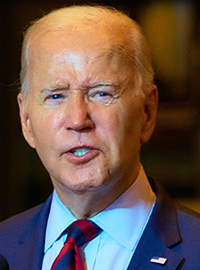| Biden SOTU Pandering on Drug Price Controls Would Only Bring Shortages |
 |
|
By Timothy H. Lee
Thursday, March 14 2024 |
State of the Union speeches by their nature already lean more toward tawdry partisan spectacle than serious policy proposals or dutiful recitation of the nation’s condition as the Constitution requires. That’s why the famously quotable late Supreme Court Justice Antonin Scalia observed that, “It has turned into a childish spectacle,” adding that, “I don’t want to be there to lend dignity to it.” Multiply that inherent level of unseriousness with Joe Biden’s unparalleled inclination toward shameless self-aggrandizing hyperbole, and it’s no wonder that the American public rated Biden’s address last week more negatively than any State of the Union in at least a quarter-century, despite media attempts to cheerlead his performance. Further illustrating the point, even Snickers had to issue a fact-check correcting Biden for falsely suggesting that the company shrank candy bar sizes as part of his desperate “Shrinkflation” campaign. Biden’s angry, shouting address nevertheless contained at least one particularly dangerous proposal that he actually seems determined to pursue. Faced with a runaway inflation problem of his making, Biden wants to pretend that he’s addressing the problem through his drug price control scheme. Biden’s plan, however, would only trigger shortages of lifesaving pharmaceuticals, not magically lower prices. Biden won’t call them price controls, of course, claiming that they’re simply allowing Medicare to “negotiate” prices. Under Biden’s scheme, however, bureaucrats dictate prices well below the targeted drugs’ list prices. Any pharmaceutical manufacturer that finds the government’s demand impossible to meet would be penalized in an amount of at least 186% of revenues, potentially reaching 1,900%. By forcing drug manufacturers to provide their products below a sustainable price, the inevitable consequence will be those drugs’ disappearance from the market. How do we know that? Because it’s already happening, even according to the Democrat-controlled U.S. Senate. Specifically, a March 2023 report from the Senate Committee on Homeland Security and Governmental Affairs sounded the alarm that drug shortages ascended to record highs after jumping 30% from 2021 to the end of 2022: Shortages of critical medications continue to rise – including drugs used in hospital emergency rooms and to treat cancer, prescription medications, and even common over-the-counter treatments like children’s cold and flu medicine. The number of active drug shortages in the U.S. reached a peak of 295 at the end of 2022. … Between 2021 and 2022, new drug shortages increased by nearly 30 percent. At the end of 2022, drug shortages experienced a record five-year high of 295 active drug shortages. Similarly, the American Cancer Society echoed the Senate, detecting rising nationwide shortages of chemotherapy drugs and other cancer medicines, which in turn “lead to delays in treatment that could result in worse outcomes.” That shouldn’t have come as any surprise. Previously, a study out of the University of Chicago warned that the Biden Administration’s price controls would delay new drug development by 7 years, mean 135 fewer new drugs between implementation and 2039, and lead to 331.5 million life years lost, which is 31 times higher than the 10.7 million total life years lost due to Covid at the time of the study’s publication: [W]e find R&D spending will be about 18.5 percent lower, or $663 billion, through 2039. This equates to new drug therapies being delayed up to 7 years due to less R&D spending leading to 135 fewer new drug approvals through 2039. The declines in new drug approvals could potentially lead to 331.5 million life years lost through 2039. For comparison, this is 31 times higher than the life years lost due to COVID-19 to date. (Emphasis added.) Moreover, the study emphasized that those emerging dysfunctions create a feedback effect in the form of higher spending on other types of healthcare treatments: Health care spending outside of drugs will be raised because new drugs on average reduce other forms of health care spending through cost offsets. We estimate a 3.7 percent increase in medical services spending due to the decline in new drug approvals. This means that budget savings from this agreement need to take into account the lack of new drug approvals that will lead to higher spending in other healthcare settings. As patients would have to rely on other ways to receive treatment or cures this would on average raise costs. For all of the criticisms leveled against it, the U.S. pharmaceutical industry accounts for approximately two-thirds of all new lifesaving drugs introduced worldwide - twice as many new drugs as the rest of the world combined. Additionally, while this rarely receives mention, Americans enjoy a far higher availability of critical drugs compared to people in other advanced economies. Of 270 new medicines introduced domestically since 2011, only 52% of them were available to our neighbors just across our northern border in Canada, 41% in Australia, 48 % in Japan, 53% in France, 64% in Britain and 67% in Germany. Accordingly, while Biden’s address last week was longer on angry partisan spectacle than substantive policy, there’s too much at stake for Congress, courts and the American electorate not take his drug price control proposals seriously and halt them. |
Related Articles : |
























